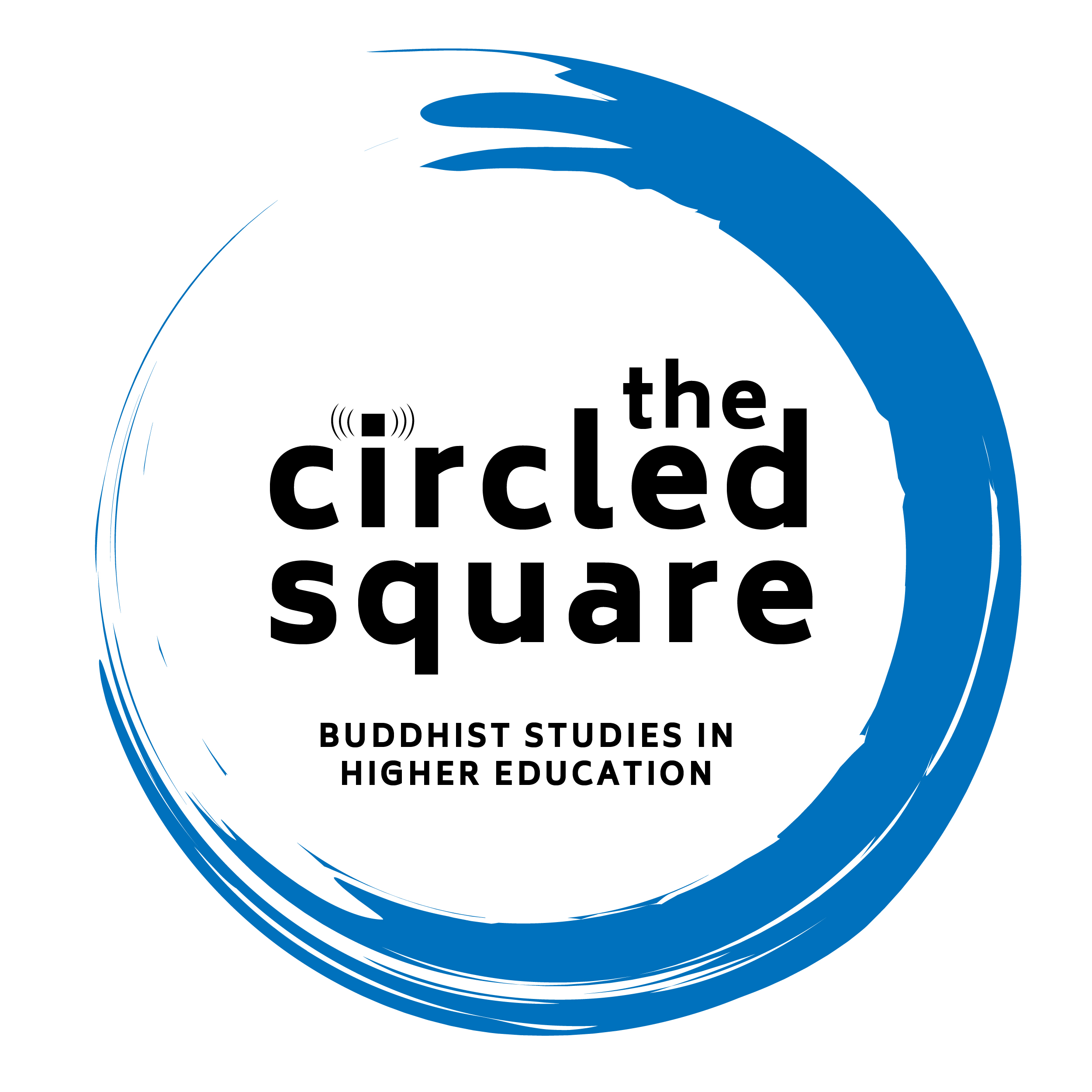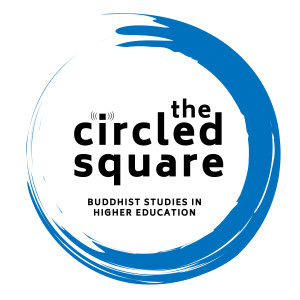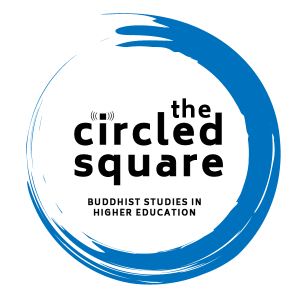
“The Circled Square: Buddhist Studies in Higher Education” explores practices of effective teaching and learning in a diversity of higher education contexts.
“The Circled Square: Buddhist Studies in Higher Education” explores practices of effective teaching and learning in a diversity of higher education contexts.
Episodes

Monday Oct 26, 2020
Luther Obrock, Constructing Buddhist Theories of the Body from Ancient Texts
Monday Oct 26, 2020
Monday Oct 26, 2020
Description
Dr. Luther Obrock from the University of Toronto shares about teaching an undergraduate course on bodies and embodiment in early Indian Buddhist texts. He wants to use his course, a seminar, to help students understand how theories are not just modern constructions, but instead can also emerge from ancient religious texts. He leads his students through ways to mine data and information about how the writers of ancient Indian texts, themselves embodied, understood and spoke about their (gendered) bodies. From analyzing the representation of the "hyper-masculine" Buddha’s body, or the status of the female body as attested in literature by or about nuns, a theory, or an "imaginary relationship to a real problem" of the body, can emerge.
Quotes
"Let’s imagine these texts as coming from embodied people." Luther Obrock
"We can use the Buddhist texts as theory to think about our own positionality." Luther Obrock
Links and References
Dr. Luther Obrock
https://www.utm.utoronto.ca/historical-studies/people/obrock-luther
Therigatha
https://www.accesstoinsight.org/tipitaka/kn/thig/index.html
John Powers, A Bull of a Man: Images of Masculinity, Sex, and the Boyd in Indian Buddhism
https://www.hup.harvard.edu/catalog.php?isbn=9780674064034&content=reviews
Charles Hallisey, Therigatha: Selected Poems of the First Buddhist Women
https://www.hup.harvard.edu/catalog.php?isbn=9780674427730
I.B. (Isaline Blew) Horner – https://en.wikipedia.org/wiki/Isaline_Blew_Horner

Monday Oct 26, 2020
Rongdao Lai, Living Religion in the Classroom: Teaching Chinese Buddhism
Monday Oct 26, 2020
Monday Oct 26, 2020
Description
In this episode, Dr. Rongdao Lai discusses her approach to teaching Buddhism as a living religion, and not only as a philosophy. As an ordained Buddhist nun in the Chinese tradition, she is intimately familiar with the contrasts between the academic study of religion and her own training in Buddhist practices at temples. She aspires to teach all of her students how to develop a critical approach to evaluating the study of Buddhism and its canonical objects: why are certain texts and topics treated as core to the study of Buddhism? The possibility of attending to lived Buddhism and contemporary problems in the study of Buddhism and the world opens up a world of new possibilities for students and professors.
Quotes
"I want students to see how people live their Buddhism." Rongdao Lai
"If Buddhism is the only course in the humanities that students take, this is an amazing opportunity to give them something they’ll never forget." Rongdao Lai
Links and References
Rongdao Lai, McGill University
https://www.mcgill.ca/religiousstudies/rongdao-lai
Bill 21, Quebec
http://www.assnat.qc.ca/en/travaux-parlementaires/projets-loi/projet-loi-21-42-1.html?appelant=MC
Marathon Monks of Mount Hiei, Japan
Documentary by Christopher Hayden, 2002
https://youtu.be/M4tcN2YfA-k (duration 52:14)
Kwaidan, 1965
https://en.wikipedia.org/wiki/Kwaidan_(film)

Monday Oct 26, 2020
Frances Garrett, Teaching Empathy and Collaboration
Monday Oct 26, 2020
Monday Oct 26, 2020
Description
Dr. Frances Garrett from the University of Toronto discusses how she designs courses in creative ways that focus on developing student skills as well as sharing Buddhist studies content. She develops creative courses for her students, leading them through experiences like an immersive year-long embodied role playing game, or a seminar where the students collaborate on writing and publishing an academic journal. As a self professed introvert for whom teaching has always been a struggle of a sort, Frances shares ways that she centers the mental health and needs of her undergraduate and graduate students, and creates a more compassionate University.
Quotes
"I think as a teacher you have to model appreciative criticism." Frances Garrett
"Students’ subjective experience can be a way into learning about interdependence." Frances Garrett
Links and References
Frances Garrett’s website and profile page
https://www.religion.utoronto.ca/people/directories/all-faculty/frances-garrett
http://francesgarrett.chass.utoronto.ca
Antioch University’s study abroad program in Bodhgaya, India (See also episode with Kerry Brown)
https://www.carleton.edu/global-engagement/buddhist-studies-india/
David Germano and the Tibetan Himalayan Digital Library
http://www.thlib.org/about/wiki/thdl%20home%20overview.html
Barnard College, Reacting to the Past - Role-playing game for undergraduate students
Todd Lewis, "Getting the Foundations Right when Teaching Asian Religions," Education about Asia, 2010
https://college.holycross.edu/faculty/tlewis/PDFs/teaching_about_asian_religions.pdf
Todd Lewis, "Representations of Buddhism in Undergraduate Teaching: The Centrality of Ritual and Story Narratives," Teaching Buddhism in the West Routledge 2002
Matt King, Barbara Hazelton, Andrew Erlich, and Nicholas Field, "Narratives of Hospitality and Feeding in Tibetan Ritual," Journal of the American Academy of Religion - article co-written by grad students
https://academic.oup.com/jaar/article/81/2/491/805712
3 Domains of Learning in Bloom’s Taxonomy
https://thesecondprinciple.com/instructional-design/threedomainsoflearning/

Monday Oct 26, 2020
Ellen Katz, Embodied Experience: Living from the Heart
Monday Oct 26, 2020
Monday Oct 26, 2020
Description
In this interview, Sarah Richardson sits down with Dr. Ellen Katz, who has a unique lens as both a practising Social worker and a practising Buddhist, and a professor who marries these two experiences in and for her students. She discusses how she teaches her students about experiential and embodied learning, and meditation practices, in an undergraduate course on mindfulness and mental health interventions, and in graduate courses on mindfulness for social work students who may apply this one day in the field. For Ellen though, it is important that mindfulness is not a tool, but instead a practice that all must experience to understand.
Quotes
"I tell them that mindfulness is something like present moment awareness that welcomes all experience without preconception or judgment. It accepts what is with curiosity and compassion." Ellen Katz
"Mindfulness isn’t a technique—it’s a process and you are the tool." Ellen Katz
"Social work is still focused on identity: duality and division. Buddhism can take social work further, looking at what we share as human beings." Ellen Katz
"I find they are so engaged and again so hungry for this knowledge, theory, and practice." Ellen Katz
Links and References
Dr. Ellen Katz, Factor-Inwentash Faculty of Social Work, University of Toronto
https://socialwork.utoronto.ca/profiles/ellen-katz/
Dr. Diane R. Gehart, Mindfulness and Acceptance in Couple and Family Therapy
https://www.springer.com/gp/book/9781461430322
Rodger Kamenetz, The Jew in the Lotus
https://www.amazon.ca/Jew-Lotus-Rediscovery-Identity-Buddhist/dp/0061367397
Toronto Zen Centre
Reggie Ray, Dharma Ocean
Gregory Kramer, Insight Dialogue: The Interpersonal Path to Freedom
https://www.amazon.ca/Insight-Dialogue-Interpersonal-Path-Freedom/dp/1590304853
Discusses relational mindfulness
Gillian Straker, The Talking Cure: Normal People, their Hidden Struggles and the Life-Changing Power of Therapy
Yuk-Lin Renita Wong, "Knowing through Discomfort: A Mindfulness-based Critical Social Work Pedagogy," Critical Social Work 5.1 (2004).
https://ojs.uwindsor.ca/index.php/csw/article/view/5636/4606

Monday Oct 26, 2020
Norman Farb on Buddhism and Contemplative Science
Monday Oct 26, 2020
Monday Oct 26, 2020
In this episode, Sarah Richardson speaks with Norman Farb, Associate Professor of Psychology at the University of Toronto Mississauga, about teaching contemplative science.
Sarah and Norm talk about the benefits and drawbacks of secularizing Buddhist practices such as mindfulness, and about his use of exercises such as mindfulness and body scanning in his courses.
Resources Mentioned
Jon Kabat-Zinn’s guided mindfulness practices, at https://www.mindfulnesscds.com/
An APS article on the concept of interoception
Ronald Purser’s book, McMindfulness
Zindel Segal and the Mindful Awareness Lab
See show notes at http://teachingbuddhism.net/norman-farb/.

Wednesday Feb 19, 2020
Wen-shing Chou on Teaching Buddhist Art Using Museum and Gallery Collections
Wednesday Feb 19, 2020
Wednesday Feb 19, 2020
In this episode, Sarah Richardson talks with Wen-shing Chou, Associate Professor of Art History at Hunter College in New York, where she specializes in the art of China and the Himalaya.
Sarah and Wen-shing discuss digital photography projects such as the Dunhuang Cave Foundation’s work with preserving and digitally archiving the contents of each cave, and they talk about taking students to see Buddhist art in galleries and museums in New York City during Asia Week.
Resources mentioned
Wen-shing Chou, Mount Wutai: Visions of a Sacred Buddhist Mountain, Princeton University Press, 2018 https://press.princeton.edu/our-authors/chou-wen-shing
Her book received an honorable mention for the AAS Levenson prize: https://www.asianstudies.org/aas-2020-prizes/
Digital Dunhuang: https://www.e-dunhuang.com/index.htm (register to see virtual caves in high-resolution)
For manuscripts, paintings, textiles and artifacts from Dunhuang, see International Dunhuang Project website: http://idp.bl.uk/idp.a4d
For an archive of photographs, rare books, and other materials on the Silk Road, see http://dsr.nii.ac.jp/
See show notes at http://teachingbuddhism.net/wen-shing-chou/.
